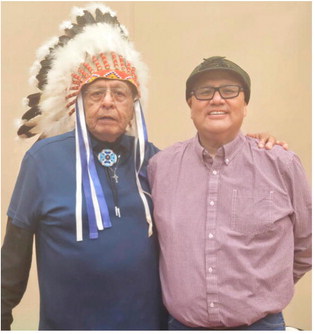Proposed Bill Would Expand Access To Native Tuition Waiver
A House bill making its way through the Legislature would revise a tuition waiver available to Native American students by expanding the program’s eligibility criteria so more people could qualify. Some state and education administrators are concerned about the financial cost of the waivers.
Rep. Jonathan Windy Boy, D-Box Elder, introduced House Bill 288 in January, when the House Education Committee tabled it unanimously. The bill’s original intent was to open the university tuition waiver to any Montana resident who can prove tribal descendancy from any of 574 federally recognized tribes. In an attempt to resurrect the bill, Windy Boy amended it to exclude descendants of tribes from outside Montana. The amended version of his bill made it through committee and onto the House floor, where it passed an initial vote March 1.
Currently, the tuition waiver is available to Montana residents who are enrolled members of a federally recognized tribe, or to descendants who can document at least one-quarter tribal blood quantum from any number of recognized tribes.
“This bill is huge, it will have good, positive impacts to tribal members, because it will delete the existing language of the one-quarter Indian blood and will open it up to descendents of a federally recognized tribe within the state of Montana,” Wind Boy wrote in an email to Montana Free Press and ICT.
Montana’s American Indian tuition waiver currently applies to Native students who are enrolled in either a federally or state-recognized tribe, as well as students who can document at least one-quarter tribal blood quantum. That means tribal students who claim descendancy with less than one-quarter tribal blood quantum are ineligible for the waiver, according to the current American Indian Undergrad Tuition Waiver application.
Tribes can determine their own tribal enrollment policies, so there are no universal definitions of descendants. The Department of Interior, however, generally defines a descendant as a person who has “lineal descendancy from someone named on the tribe’s base roll or relationship to a tribal member who descended from someone named on the base roll.”
During the House floor discussion on the bill on March 1, Rep. Jane Gillette, R-Bozeman, said she had concerns after speaking with representatives of the Montana University System about the waiver. The waivers come at a cost to the schools, she said.
“Universities don’t receive any funds for these waivers,” she said. “It’s seen more as a liability and not an asset for the university because there is no money behind those waivers. Until there’s money behind those waivers to help encourage schools to actually accept our Native American friends into the academic organizations, I’m going to be a ‘no.’” According to the bill’s fiscal analysis, if all in-state American Indian students were granted the waiver it would decrease universities’ tuition revenue by $4.7 million in 2024.
Helen Thigpen, deputy commissioner for government relations and public affairs for the Montana University System, said in an email that HB 288 would significantly affect the system’s campuses, which would have to figure out how to cover the revenue losses.
“Increasing access for American Indian students remains a top priority for all MUS campuses,” Thigpen said. “But state-based funding would be needed to implement the waiver fully.”
Rep. Marilyn Marler, D-Missoula, who is a faculty member in the biological sciences department at the University of Montana, said working with Indigenous students is one of her favorite parts of the job.
“It is not true that the tribal students on waivers are not a benefit to the university community,” Marler said. “They provide a lot of benefit to every aspect of education at the University of Montana. I’ve learned a lot from my colleagues and from the Native American students.”
Michelle Guzman, director of the American Indian Student Success Services at the University of Montana, said the waivers help make higher learning accessible to a population that historically had reduced access.
“It’s really good. I think it helps our students a great deal because of the cost of college, people don’t really know or expect what it costs,” Guzman said. “You know, the difference between you having your tuition, and then you have all your fees, your room, your board, your books, and it really adds up, and so the tuition waiver really helps a lot so students are able to help them better afford college.”
The American Indian tuition waiver came about as a policy to promote and encourage access to higher education for American Indians within the state, according to the Montana University System website. In the 20192020 school year, 832 Native students accessed the tuition waiver.
A common misconception about the tuition waiver is that the waivers cover the entirety of a student’s college expenses, including fees, books, meals, room and board. The waiver applies only to tuition, as noted on the MUS webpage.
“Nothing is free here, and for applicant students who apply for college, they have to go through the whole stringent application process like every other student has to go through. They have to fill out their FAFSA and all these other applications, and this is basically the last resort on that line,” Windy Boy said in his closing statement on the floor.
HB 288 is now re-referred to the House Appropriations Committee for further debate and a vote after the transmittal break.


